Bible Stories for Young Adults



Teenagers - Were Jesus’ Disciples Teenagers?

Some teenaged boys were running through the grain fields taking a few grains
to eat. There were some religiously strict adults standing by who did not
like this "gathering of grain" because it was the Sabbath. (Taking and
eating from a field was not stealing. It was stealing only if one took a
container to carry away the produce.) Tradition was all important. In
fact, for the first-century Pharisees, and many other Jews, tradition had
the same authority as the written scriptures.
They appealed to the boys' teacher. "Jesus, your disciples are breaking the
Sabbath!" To this Jesus replied that even David, when he was hungry, went
and ate the priests' bread, which was unlawful.
Again, these youths got into some trouble with the Pharisees. They were
eating without going through the rigorous hand-washing ritual that the
Jewish tradition dictated.
The Pharisees complained to Jesus, "Why do Your disciples transgress the
tradition of the elders? They do not wash their hands when they eat bread."
To this Jesus swept back a stinging indictment. "Why do you also transgress
the commandment of God by your tradition?" He proved that they do not honor
their parents by their tradition and in fact make God's Word of no effect by
their tradition. Jesus' rebuke was so shocking to his disciples they they
worried because they knew the Pharisees were offended by it.
Finally, some Pharisees told Jesus to make his disciples quit singing his
praises on Palm Sunday. Jesus simply said, "If they keep quiet, then the
stones will cry out."
Why did Jesus have disciples anyway? Disciple-teacher groups were common in
Palestine and the Hellenistic world for a couple of centuries, which
included the time of Christ. The Greeks had teacher-pupil groups, where the
learners would accept the teachings and life purpose of their teacher by
listening to him and spending time with him. During Jesus' day, John the
Baptist had disciples and the Pharisees had their disciples. These
discipleship groups became like another family to those involved. Of
course, the disciples would be younger and less knowledgeable than their
teacher, for Jesus said, "It is enough that a disciple become like his
teacher." Jewish disciples were generally young enough to not be married
with family responsibilities and old enough to read and not be a burden to
the group.
The Jewish male was considered a man by the time he was thirteen years of
age. He was old enough to be considered one of the ten men necessary to
form a synagogue. He was to know how to read well enough to be able to read
the scriptures if called upon in the synagogue.
Therefore, we can assume two things about the age of Jesus' disciples. They
were at least thirteen years of age, but less than the age of thirty, which
was the age of Jesus when he began his three-year ministry. Disciples were
younger than their master, and they spent three years with Jesus.
Three years may also have been the usual amount of time that a disciple
remained under his master's tutelage, for we see that to be the number of
years that Daniel and his three Jewish companions were in training in
Nebuchadnezzar's Babylonian school. In this amount of time, which would
have been equal to four years' college (omitting summer study) that the
young adults of today have.
There are many characteristics of teenaged boys that these disciples
manifest. I did not realize these characteristics to be so strong in bright
and healthy young men until one year when I taught physics to five such
boys. No girls were in the class. These were the traits I saw in these boys
and also in Jesus' disciples:
Competitiveness
As the Jesus and his disciples were on the way to Capernaum in Galilee, his
disciples began disputing among themselves as to who would be the greatest.
Jesus overheard them, but waited until they were in the house to ask them
what they were arguing about. They were ashamed to answer, but Jesus took
this as an opportunity to teach them that the one who desires to be first
will be last. He took a child up into his arms and spoke of humility.
James and John desired to sit at Jesus' right and left hand when Jesus would
be enthroned. But this glory-seeking was not enough, for even their mother
came to Jesus kneeling and appealing to him for her sons to occupy those
high places. This seems typical of a mother who is overly ambitious for her
teenaged sons, not like the mother of older men.
Of course when the other disciples heard this, they were indignant. Even at
the Last Supper, the disciples were still disputing about who would be
greatest. It was at this point that Jesus had to demonstrate that the
greatest would be servant of all by his washing the disciples' feet. Foot washing
was the task of the lowest of servants in that day. Most people considered
themselves “too good” to do a lowly task like that.
Opinionated
A number of times it is said that the disciples were greatly astonished at
something Jesus taught. They asked, "Who then can be saved?" when Jesus
told them that it is difficult for those who have riches to be saved. In
their minds, if one were rich, it was proof that God was on his side.
Another time, Peter was seriously rebuked when he would not accept the fact
that Jesus was going to be crucified. Jesus said, "Get thee behind me,
Satan!" because Peter could not understand why his Messiah would have to
suffer.
Their opinions got them into arguments with teachers of the law. But
opinionated teenaged boys like to debate, don't they?
Proud, Sure of Oneself
When Jesus asked James and John if they would be able to "be baptized with
the baptism with which he would be baptized" he was talking about the
suffering he would have to endure. James and John quickly replied, "Yes, we
are able." Jesus agreed they would suffer for his sake, but they really did
not understand the full impact of suffering that Jesus would suffer.
When Jesus finally decided to go to Judea where he knew his enemies awaited
him, Thomas said, "Let us go too that we may die with him." Yet, Thomas,
like the others, dispersed and hid when Jesus was taken by his enemies.
Peter was so sure he would be able to follow Jesus even unto death, and that
he would not fall away. Yet Jesus foretold quite accurately that Peter
would deny he even knew Jesus three times before the rooster crowed on that
fateful night of Jesus' arrest.
Indignant or impatient toward others
Teenagers are young and rarely can place themselves in others' shoes to
understand how they feel or what their true motives are. Thus they tend to
judge negatively before understanding a person and his or her situation.
The disciples did this on several occasions.
Perhaps the greatest outburst was that of James and John when the Samaritans
would not allow Jesus and his disciples to pass through their country on
their way to Jerusalem. James and John suggested to Jesus that he call down
fire from heaven to burn them up, as Elijah had done to his enemies. Jesus
rebuked them sharply for the spirit that had caused them to say this.
"Squash your opponents! Overkill! Instead of turning the other cheek, swat
him back twice as hard on both cheeks!" That seems to be the natural trait,
which Jesus wanted to correct in his disciples.
John also did not want those who were not following "us" to be casting out
demons in Jesus name. John told Jesus that they forbade that man from
doing so, but Jesus was quite a bit more tolerant, saying that those who do
a miracle in His name can't speak evil of Him.
Another time the disciples were impatient toward Jesus for not answering the
cry of a Syro-Phoenician woman. Then the woman started pleading to the
disciples, so they urged Jesus to send her away. Instead, Jesus ended up
answering her request and healing her demon-possessed daughter.
The disciples also rebuked the parents who were bringing their children to
Jesus to be blessed. Jesus then became displeased with his disciples for
their attitude and told them to let the children come to him.
Then, near the end of Jesus' ministry a woman anointed Jesus' feet with pure
nard. The disciples were indignant at this "waste" of a valuable commodity,
thinking it could have been sold for a high price. Though all expressed
their disapproval, Judas acted on it and went out to plot against Jesus.
Jesus defended the woman's act of love and generosity, saying she would be
remembered for it where ever the gospel is preached in the world.
Physical capability
Jesus had to walk many, many miles during his three-year ministry. Some
have estimated that he walked 3,000 miles. The disciples were with him and
had to be in good physical shape. Sometimes they would have to go without
eating. They probably required more sleep than Jesus, as growing teenaged
boys often do, because Jesus could get up a great while before day to pray.
In the garden of Gethsemane Jesus could not keep his tired disciples awake
even though they knew Jesus had already been turned into the Jewish
religious authorities by Judas.
Four of these young men were used to the hard labor of being fishermen.
They could haul in loads of fish and manage the sails on a fishing boat in
storms. They were not the bald-headed, white-bearded elderly men in
artists' depictions. Jesus needed to train young men who would be able to
travel long and difficult routes to take the gospel to every nation, and to
be able to stand in the days of trials and persecutions that they would see.
This would take mental fortitude as well as spiritual and physical strength.
Desiring to learn
Bright young men want to grow in knowledge, and Jesus' disciples certainly
did. They did not mind asking him questions about the parables he taught.
They wanted to know about forgiveness. They asked him about the future of
Israel and about Christ's return. They wanted to know why Elijah must come
before the Messiah and Jesus let them know that John the Baptist was the one
who came in the spirit and power of Elijah. When Jesus told them He was
going away, they wanted to know where, and why couldn't they follow him
there, and why wouldn't He show Himself to the world.
There were many things the disciples did not understand. They would ask
among themselves, "What does He mean by that?" They would misunderstand,
get confused, or take words too literally because they did not understand
the spiritual context. But all of these traits are quite typical of
teenagers.
Feeling spiritual needs
Despite all the natural tendencies that normal teenagers have, the
disciples also felt a need for a spiritual relationship to God as their
father. They wanted Jesus to teach them to pray. They requested of Jesus,
"Increase our faith." Philip asked, "Show us the Father, and that will be
enough for us."
The disciples could get just as excited about God's manifesting Himself
through them as any teenager today would. After Jesus sent them out to
evangelize and heal in His name, they came back rejoicing that even the
demons submitted to them in Jesus' name. But Jesus warned them not to
rejoice over this, but to rejoice that their names were written in heaven.
At least one of the disciples insisted on knowing the truth for himself.
That was Thomas. Thomas' refusal to believe unless he was shown what the
other disciples had seen is often seen as undesirable doubt or skepticism.
However, wanting to be sure of the truth about Christ is a good trait.
Until one comes to terms within himself about who Christ is, an "inherited
faith" or "just-go-along-with" type of indoctrinated belief is really no
real experience of faith at all. Faith is a gift of God, for Christ told
Peter upon his confession that Jesus was the Christ, "Blessed are you, for
man has not revealed this to you, but the Father in heaven has." But Jesus
also told Thomas, "You believe because you have seen for yourself. Blessed
are those who have not seen, yet have believed."
What about Peter?
Peter's name is mentioned in the gospels more than that of any other
disciple. Doubtlessly he was the oldest. He is the only one of the
disciples who may have been married. His wife is not named or even
mentioned, but his mother-in-law is healed of a fever by Jesus. This woman
could have been the mother of a wife he'd already taken or of one promised
to him in betrothal. The disciples as a group were so astonished at Jesus'
strict teaching against divorce that they replied that it would be better
not to marry. This sounds like a comment that would be made by someone not
yet married.
Peter was impulsive and we see his questioning Jesus or making requests more
than the others. The younger disciples were probably happy to let the
eldest among them do the talking, walking on water, refusing to get his
feet washed by Jesus, admitting his sinfulness, making preparations for the
Passover, running inside the empty tomb, and declaring his loyalty by
saying, "You are the one who has eternal life."
Another reason to believe that Peter was the eldest is because only he and
Jesus were required to pay the temple tax. The younger men were not
approached by the tax collector. Men at or above the age of 20 were required to pay the temple tax. So, it stands to reason that only Jesus and Peter were taxed if Peter were the oldest and the others were teenagers.
Peter accompanied Jesus, along with James and John, when the others were not
around. He was on the Mount of Transfiguration and there he spoke asking to
build three tabernacles in the midst of a visit from heaven! Peter, James,
and John were the three nearest to Christ when he was praying in the Garden
of Gethsemane, and they were the only ones allowed to accompany Jesus when
he raised the 12-year-old girl from the dead. Besides this, Jesus gave to Peter
"the keys of the kingdom" and said upon the rock of Peter's kind of faith
would He build His church.
What about John?
John, called the beloved disciple, was probably the youngest of all the
disciples. He called himself "the disciple Jesus loved." Perhaps Jesus
gave him special attention due to his being the youngest. John, who may
have appeared younger, possibly not even having grown facial hair, would
have appeared to Jesus' enemies as a mere boy, and not a threat to their
political power.
John safely accompanied his own mother Salome and the other women to the
crucifixion site. As John stood near Mary the mother of Jesus, it was then
that Jesus assigned John to his mother and his mother to John. No longer
would Jesus be around to teach John more and no longer would he be available
to his sorrowing mother. Jesus must have felt that John and his mother Mary
would fill a void that Jesus' bodily presence would leave in each of their
lives. Since Jesus had four brothers left to see after his mother
physically and John had his own mother right there at the cross, I do not
think that Jesus was assigning John to take care of his widowed mother in
his place. Nor do I believe John needed Mary to be his literal mother. The
mutual spiritual edification was more likely what Jesus had in mind.
Peter and John together did things for Jesus that other disciples were not
involved in. They made preparations for the Passover. They were also the
two disciples who ran to the tomb of the risen Christ after the women had
reported that the body was no longer in the tomb. After Jesus'
resurrection, Jesus engaged Peter in conversation to restore him. Jesus
asked him if he loved him three times. He then told him to "Feed my sheep"
and that one day he would suffer death for his leadership. John was
listening in and Peter turned to ask Jesus what would become of John. Jesus
mildly rebuked Peter for even asking this. After Jesus' ascension, Peter
and John were arrested together after the healing of a crippled man in
Jesus' name at the temple.
Teenagerism
The Bible doesn't come right out and say that Jesus' disciples were
teenagers, because the word "teenager" is not in the Bible; it is a 20th
century word. The word "teenagerism" is not even in the dictionary, yet the
word is in use today to describe the state of being a teenager in a negative
way. Teens today have low expectations, and society expects them to be
irresponsible, immature, rebellious, and a host of other negative
characteristics.
Alex and Brett Harris are twins who co-authored a book entitled Do Hard
Things: A Teenage Rebellion Against Low Expectations. As teens themselves,
they lived I Timothy 4:12 which says, "Don't let anyone look down on you
because you are young, but set an example for the believers in speech, in
life, in love, in faith, and in purity." The Harris brothers' book is
highly recommended by such authors as John Piper, Randy Alcorn, and Chuck
Colson, as well as by many teens themselves.
Modern American society has allowed children to grow up without rules,
without boundaries, without responsibilities, without learning how to work,
without developing their talents and abilities, and without doing good
things for others. Without the familial love of both mother and father,
they often do not learn how to love. They are adopting the "pop" speech of
the TV and movie and rock star celebrities. They cannot have faith when
they don't know the truths upon which faith is built. The public schools
certainly have low expectations of teenagers in the area of purity. They
expect teenagers will be having sex, so they have sex education and
distribute condoms.
Michael Waldstein, a father of eight and internationally known Bible
scholar, says that "teenagerism" is a modern construct. Teenagerism is due
mainly to absentee fathers, both physically and emotionally. The sexual
revolution of the 60's also has played a part in the eruption of
"teenagerism." Also the rise of technology in the home and the explosion of
the entertainment industry has been detrimental to youngsters.
So what do we get? Teenagerism. A whole host of books on how to deal with
teenagers. The problem years. The years they are going to try alcohol,
drugs, sex, and maybe even shoplifting. The years when they are going to be
disrespectful, lazy, and whine about everything they have to do. They often
become seriously depressed. Those dreaded "terrible teens."
The sad thing is that if teenagers get heavy into alcohol or drugs, they may
never grow out of "teenagerism." Prominent psychiatrists have given
evidence that substance abuse locks ones mental, emotional and psychological
states into that of a teenager and until the substance abuse is overcome,
they never heal.
Not every teenager is affected by "teenagerism." They have parents who are
not caught up in the "busyness" of the world outside the home. They have
time to devote to teaching their children how to be constructive and
productive. They remove the excessive influence of peers and
entertainment. They may live a less affluent lifestyle and they will teach
good stewardship of both time and money. Many find alternative schooling
for their children.
Though Jesus' disciples may have been teenagers, with only one or two
exceptions, they were not affected with "teenagerism." Jesus did not have
low expectations of them either. He knew Satan desired to sift Peter as
wheat, but he prayed for Peter that his faith would not fail. He knew there
was only one of them -- Judas -- who would become the devil's pawn. The
rest followed Christ faithfully, even unto death. After all, the disciples
had not chosen Christ. He had chosen them to bear fruit for the kingdom of
God that would remain forever. They abode in His Word and were his
disciples indeed.
Discussion:
1. What do you consider to be the best evidence that most of the disciples
of Jesus were in their teens rather than older adult men?
2. How can tradition be a problem for Christians?
3. What evidence is there that Peter was the oldest of the disciples?
Give evidence that Peter was the impulsive type.
4. What evidence is there that John was the youngest?
5. What traits of the disciples are common to teenagers?
6. How did disciples learn from their masters in Jesus' day?
Could this be a clue as to how parents could teach their children?
7. What are the causes of "teenagerism?" What can be done to prevent
"teenagerism?"
8. Why are there so many adults today, even in their 30's and 40's, who
still act like teenagers?
9. What kind of dealings with teenagers did Jesus model for us?
10. What kind of childhood background do you suppose the disciples had that
was quite unlike that of children today?
11. For what purpose does Christ choose for any of us to be His disciples?
What sets us apart as His "disciples indeed"?
-
12. What are some positive ways that teenagers can involve themselves with
others? What are some positive things that teenagers can do for themselves
to help them bring more glory to God?
Teenagers and other young single adults in our families are often looked upon as near-hopeless cases of foolishness, irresponsibility, disrespectfulness, and out-of-control hormones. Perhaps our decadent society has taught them to be this way, but Jesus disciples were also living in an adulterous society. Just as Jesus reached out to bless little children, he would have seen great potential in teenagers. This study here gives evidence to the idea that Jesus’ disciples were teenagers, with the possible exception of Peter who would have also been a young adult.

With this last study, I have given no Bible references because it would basically require the entire New Testament gospels of Matthew, Mark, Luke, and John, which are separate biographies of Jesus Christ and tells the many events with and teachings to his disciples. Please try to study this lesson thoroughly and then start reading these four gospels. Many stories in the gospels overlap, but each gospel has its unique presentations of the life of Christ due to the different perspectives from which the writers saw and understood Christ.
You will be full of joy in coming to know Christ through the pages of the Bible, just as I have.
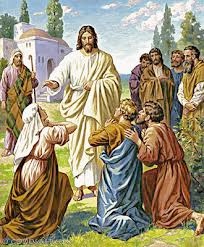
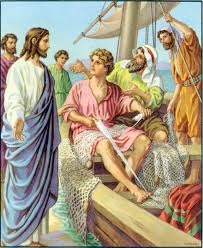
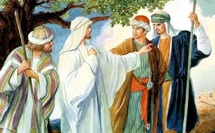
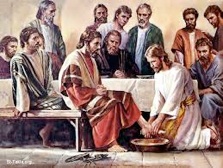
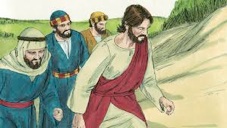
Salome, the mother of James and John, asked Jesus to place her sons in the highest seats. But Jesus taught humility and service by washing the disciples’ feet.
Jesus and his disciples were in good physical shape. Not only had they done hard manual labor, but they walked long distances from Galilee to Judea.
Jesus rebuked James and John for suggesting that Jesus call down fire upon the Samaritans.

The disciples were sometimes astonished, opinionated, yet inquisitive, and desiring to learn from Christ.
John was probably the youngest disciple, though he was old enough to help his father Zebedee in his fishing business, along with hired hands.
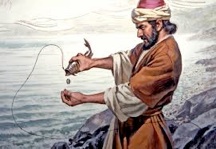
Peter, most likely the oldest disciple, was old enough to be required to pay the temple tax. Jesus told him to find a coin in the mouth of a fish to pay it for the both of them.

Jesus was displeased that the disciples did not want the children to be brought to Jesus.
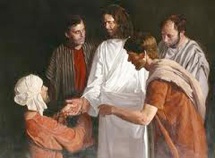
Jesus makes a post-resurrection appearance to “Doubting Thomas.”

The disciples wanted to know where the place was to which Jesus was going and to which He said they would also go.



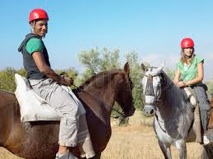

Positive Things that Teenagers can do!
Teens can work. Babysitting, tutoring, and other jobs --even helping around the house.
Be conscientious about schoolwork or other learning.
Develop skills or hobbies. Learn to work with animals.
Participate in sports or other group activities.

Enjoy some downtime communicating with friends, but be careful not to overdo the electronic media.
Serve the Lord in mission trips, works of mercy, or other church activities.

